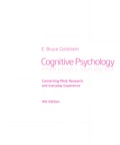
Introduction
In psychology, the mind is not thought of as a physical entity, but rather as an element or a set of cognitive abilities that enables individuals to be aware of their experiences in the world and their surroundings. It helps people in the processes of consciousness, perception, judgment, memory, language, and thinking.
Explanation of Solution
Answer and explanation
The mind can be defined as something that creates and controls mental functions such as memory, thinking, perception, attention, language, as well as reasoning. According to this explanation of mind, it can be viewed as an entity that plays a major role in determining an individual's mental abilities. Cognitive psychology studies these processes to comprehend the characteristics and properties of the operation of mind.
Another way in which the mind can be described is by taking the way it operates into consideration, in which it could be thought of as a system that produces representations of the surroundings of a person, so that they can achieve their goals and act within it. This points out the efficiency of the functioning ability of the mind, which is essential for survival.
Want to see more full solutions like this?
Chapter 1 Solutions
EBK COGNITIVE PSYCHOLOGY: CONNECTING MI
- A theoretical framework for understanding behavior to include genetics, evolution, heredity, and neuroscience is called ____. behaviorism psychodynamic approach biological view bioecological approacharrow_forwardThe process of learning to be a human being within your culture, family, region, and ethnicity is a term known as ____. evolution accommodation assimilation socializationarrow_forwardIf you believe that maturation is a primary influence on developmental changes, which of the following would you believe explains change?arrow_forward
- One well-known approach that emphasizes that human development is a dynamic, interactive process that begins with an individual's genetic endowment and unfolds over time as a result of interaction with various levels of environment is known as ____.arrow_forwardA theoretical framework for understanding behavior to include genetics, evolution, heredity, and neuroscience is called ____.arrow_forwardPrompt: Share an experience where you encountered a song or style of music that you either loved immediately or despised at first listen. Describe your initial reaction and the factors that influenced it. Did your perception of the music change over time, and if so, what led to that shift in perspective? Response Guidelines (150 words or more): Reflect on your initial impressions of the music and how they shaped your perception of the piece or style. Discuss any changes in your opinion over time, including what factors contributed to your evolving understanding or appreciation. Consider the aesthetic principles or cultural context of the music that influenced your perception.arrow_forward
- Based on the Stimulus Preference Assessment Decision Model (see module 2 learning folder), when would you use a Paired Stimulus versus a MSWO? The Peer Feedback Form in module 2 provides a glimpse of an individuals’ performance in a group setting. How can you graph the Peer Feedback Form so that it can be used to measure individual performance in a group format for 8 weeks? A group member shows a decreasing trend in preparation across 3 sessions. Draw a graph that shows this performance. The Group Productivity Check-in is an example of the Behaviorally Anchored Rating Scale (BARS). The rating scale has the highest score being 5 with opportunities to assess performance across five categories. How can individual performance be graphed so that it is easy to understand and easy to see? As the instructor, your intention is to present the graphs depicting group performance to the class. These graphs display the average performance of team members and aim to highlight ratings above 90%. In…arrow_forwardWhat are some lessons learned and gained from working with school behavior students? How to indicate what worked, what didn’t, and list organizational & societal challenges & opportunities. Include critical analysis of what changes or adjustments you would suggest or try in the field or program, to improve efficacy.arrow_forwardAs we embark on this 10-week course on the psychology of creativity, I encourage each of you to evaluatethe various theories and ideas presented in the course from multiple perspectives. Specifically, reflect onhow the given theory/concept does or doesn’t capture your own experience, when engaged in creativeendeavours. Then, because no one theory is likely to have universal applicability, consider whether itseems to capture aspects of the creative process you’ve observed in others. Also think about whether itcaptures elements of your own evaluation of creative work (including the work of those around you aswell as the work of well-known artists).Although no one theory is likely to explain or describe everything about creativity, the so-called “Four Cs”discussed in this week’s readings give us one starting point, to classify subtypes of creativity. Kaufmanand Beghetto (2013) describe the following types of creativity:• Big-C: Genius-level works, generally regarded as masterpieces. Their…arrow_forward
 Ciccarelli: Psychology_5 (5th Edition)PsychologyISBN:9780134477961Author:Saundra K. Ciccarelli, J. Noland WhitePublisher:PEARSON
Ciccarelli: Psychology_5 (5th Edition)PsychologyISBN:9780134477961Author:Saundra K. Ciccarelli, J. Noland WhitePublisher:PEARSON Cognitive PsychologyPsychologyISBN:9781337408271Author:Goldstein, E. Bruce.Publisher:Cengage Learning,
Cognitive PsychologyPsychologyISBN:9781337408271Author:Goldstein, E. Bruce.Publisher:Cengage Learning, Introduction to Psychology: Gateways to Mind and ...PsychologyISBN:9781337565691Author:Dennis Coon, John O. Mitterer, Tanya S. MartiniPublisher:Cengage Learning
Introduction to Psychology: Gateways to Mind and ...PsychologyISBN:9781337565691Author:Dennis Coon, John O. Mitterer, Tanya S. MartiniPublisher:Cengage Learning Psychology in Your Life (Second Edition)PsychologyISBN:9780393265156Author:Sarah Grison, Michael GazzanigaPublisher:W. W. Norton & Company
Psychology in Your Life (Second Edition)PsychologyISBN:9780393265156Author:Sarah Grison, Michael GazzanigaPublisher:W. W. Norton & Company Cognitive Psychology: Connecting Mind, Research a...PsychologyISBN:9781285763880Author:E. Bruce GoldsteinPublisher:Cengage Learning
Cognitive Psychology: Connecting Mind, Research a...PsychologyISBN:9781285763880Author:E. Bruce GoldsteinPublisher:Cengage Learning Theories of Personality (MindTap Course List)PsychologyISBN:9781305652958Author:Duane P. Schultz, Sydney Ellen SchultzPublisher:Cengage Learning
Theories of Personality (MindTap Course List)PsychologyISBN:9781305652958Author:Duane P. Schultz, Sydney Ellen SchultzPublisher:Cengage Learning





